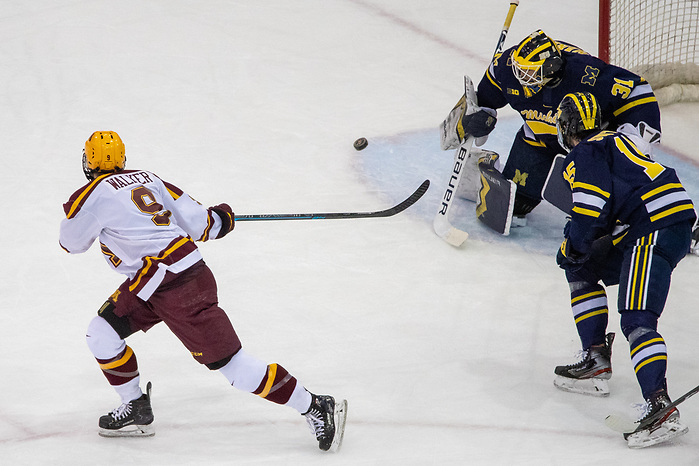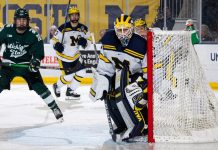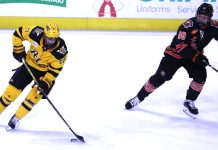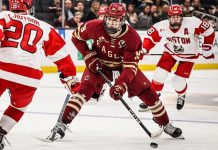
Among the many ways to process a season ended by a global pandemic, perhaps the most unexpected is with optimism.
“It’s like we’re all living in a movie. This is crazy. But what can you do? I’m always a glass-half-full guy,” said Michigan coach Mel Pearson. “We’ll move forward and we’ll get everybody through it, hopefully. Maybe it’s nice to slow down a little bit. We’re so busy. We’re so caught up in everything.”
Five days after learning that the season was over for everybody, the Michigan coach was putting things into perspective.
“I am more encouraged by being around the people that we have and even in all of college hockey,” said Pearson, who emphasized how much he’s enjoying coaching this current generation of players.
“I can’t speak for other sports,” said Pearson, “but in college hockey in general, the young people we have that are going to grow up and be leaders in our communities and all over – we’ve got some very special, special, special people.”
Minnesota’s Bob Motzko said, “In the big picture of it, our guys are great. The real question is, what do we do now? I think over the next two weeks, we’re all going to have to figure that out. It is going to pass. Life is going to get back to normal at some point, but what do we do now until then? That’s what we’re all trying to figure out.”
The what-to-do-now part of it is something that propels the four coaches of teams still viable in the Big Ten tournament when the NCAA announced that the season was over. Penn State was set to host Minnesota and Michigan would have traveled to play Ohio State.
“We’ve got to take this thing seriously,” said Ohio State’s Steve Rohlik. “The better we do that, the sooner we can, hopefully, get back to normality, whenever that might be.”
And whatever “normal” might be. There is so much that cannot be planned right now.
“Everything’s on hold – recruiting, everything,” said Pearson. “We’re just trying as much as we can to talk about the year, keep the players informed of what’s going on. There are still so many questions. Just try to come up with a plan for spring and summer, given the information we know.”
Coaches are cautioned to practice the same social distancing that the rest of us are encouraged to do.
“I haven’t seen my staff now in three days or four days,” said Motzko. “I’m starting to see my family all the time. That’s different – not only different for me, but I’m sure it’s very different for my family as well. Every week, we’re all going to have to circle back together to see how everything’s going. It’s going to be new and different for every one of us.”
Motzko said that everyone’s really waiting for direction.
“Our leaders above us – whether it’s in our university, NCAA, Big Ten office – they’re going to have to take a break and follow this and we’re going to take direction from them,” said Motzko. “In the meantime, it’s make sure all our players are safe, they’re at a place where they’re comfortable. Last week was Week Zero. This is Week One.”
This ability to move forward doesn’t mean that recent events haven’t been, as one coach put it, crushing. Both the Wolverines and the Golden Gophers were on the bubble of the PairWise Rankings, but Penn State and Ohio State were certain to advance to the NCAA tournament.
For the Nittany Lions – a team with 10 seniors – the ending was particularly keen because Penn State was anticipating a return to play after earning a first-round playoff bye and after their regular season ended with a bye week.
“We were just really excited and looking forward to playing for everything that the Big Ten tournament was going to bring,” said Penn State coach Guy Gadowsky. “We were fortunate enough to know that we were already going to be in the NCAA tournament, so boy, every day was great because it was just very, very exciting.”
Gadowsky said that his senior class is “very, very close” and that they were wanted to end their time at Penn State by making a statement.
“Their freshman year, they won the Big Ten tournament when, at the time, Penn State was still supposed to be not very good,” Gadowsky said. “I think they wanted to prove that that wasn’t a fluke. They all stayed together and they’ve worked extremely hard to get back to the tournament and to go a lot further, and they really thought they could do that. I really feel for them.”
The eight-member Ohio State senior class was poised to do something that no other class had done in Buckeye hockey history — make a fourth consecutive trip to the NCAA tournament. This class also is the second in history to have earned 20 or more wins each of its four years.
“They believed in us enough here to come to Ohio State, to believe in what we’re doing here and believe in our culture, to believe that we can compete and win on a night in-night-out basis,” said Rohlik. “This group blended in, carried on the culture from their freshman year on to leading this year. I give them credit for carrying on what we thought we could do here and the program’s in a better place now than when they got here.”
Pearson said that telling his players that their season was over without getting to play another game was one of the hardest things he’s ever had to do as a coach.
“It was an emotional room,” said Pearson. “We have nine seniors. The thing is, they felt really good about where we were and our chances and our opportunity. It’s not like you’re going in there telling a team that’s got no chance or talking to a team whose season was already over. It’s totally different. It was hard.
“All you can do at that point is thank them, tell them that you love them, and that when they look back this will be a minor setback in the big picture of things for them. I told them to stick together and that’s about it. Still, I think the words ring shallow.”
Motzko said that once it was revealed that Rudy Gobert of the Utah Jazz had been diagnosed, “everyone expected” things to change rapidly but that “when the final word came down, I only have three seniors, but it was really the look on their faces that was the hardest. I think the rest of our team is so young and their time, I think they know their best time is to come that they’re more able to handle it.”
All four coaches talked about getting caught up on hockey-related things that they’ve been putting off, like reviewing tape, tweaking systems, gathering information and consulting with others – from a safe distance.
“Like a lot of coaches, I’ve got all these little projects that I’ve wanted to work on for about 10 years,” said Motzko. “I’m actually now going to hold myself accountable. There’s a lot of professional development things we can do, and we all have them. We all talk about them.”
Motzko added that there are projects at home, too. “Oh, that list has already grown, too. I’ve already been informed of that.”
Pearson said that his daughters are happy to have him around to spend time with his three grandchildren, all under the age of five. On March 16, he posted a video of a little family quality time.
At this time last night we should of been in Columbus Ohio beating Ohio State ! Bus ride 3 hours , game time 2.5 hours singing the “Victors “ awesome . Being at home with my 3 grandkids playing the piano ….Priceless ! ?
〽️GoBlue ??? pic.twitter.com/9YCucH0KGV— Mel Pearson (@CoachPearsonUM) March 16, 2020
“That’s what it’s all about, really,” said Pearson.
Rohlik said that he’s “just figuring it out day to day for now.”
“Everybody’s safety is the top priority,” said Rohlik. “We just happen to be involved in the sport thing.”
And that sports thing is what everyone will get back to when hockey resumes, and it will, said Motzko. “I couldn’t believe not having a season next year. There’s too many good people, too many smart people who can figure this out.”
In the meantime, said Motzko, forward-looking is the only way to be. “I think all of us, we have to create a new world to be busy and productive. We can’t do nothing, That doesn’t work.”
One good kid among many
This week, I put out the word that I would like to get the perspective of the seniors from the four B1G teams that were still playing when the NCAA announced the end of the season, but so many of them had scattered that it was nearly impossible to do so.
It was a great stroke of luck, then, to get a call from Jake Slaker, the Michigan senior forward and assistant captain from Chicago.
“Honestly, it’s still doesn’t even feel real,” said Slaker. “It’s like such a weird feeling.”
Slaker, an undrafted player, finished his season with 14 goals and 17 assists in 33 games, one goal short of his career-best 15 in 40 games during his sophomore year. He was riding a four-game point streak into the Big Ten semifinals, including two goals in quarterfinal action against Michigan State, one of them a game-winner.
All of that now is history.
Still in Ann Arbor, Slaker is figuring out his next step. He has a semester to finish online, as Michigan is one of the many colleges and universities that is shifting to a virtual classroom in an attempt to contain the spread of COVID-19. It’s the first time in his life that he’s been just a college student, with no hockey competing for his attention.
“I kind of feel like I’m unemployed right now,” he said.
He was joking a little, but it’s an accurate statement.
Like a lot of undrafted players, Slaker was looking at professional possibilities to follow the end of his collegiate career.
“If my season ended Sunday, I was planning on seeing what my professional options were,” he said. “I was hoping it would be signing a contract and starting my new journey with my new team right away. Now, you talk to your coaches and your people, and the thing is nobody knows what to do because this isn’t a normal situation. It’s kind of like a stagnant state.”
That limbo isn’t limited to hockey. Slaker called Ann Arbor a ghost town.
“You see people packing up their cars and heading home,” said Slaker. “Sports aside, all seniors don’t get the experience of the end of their last semester and graduation is cancelled. I feel so bad for my parents.”
See? Lucky. Slaker’s world as he knew it – school, hockey, plans for his profession – shifted suddenly in unimaginable ways, but Slaker said he feels terrible for his parents.
“At the end of the day, I don’t think we’d appreciate it as much as we would as if we were older, but my parents are definitely feeling that for sure,” said Slaker.
When I talked to Mel Pearson this week and he shared his optimism for our future as a whole, he pointed to Slaker’s generation.
Pearson said, “They’re bright, intelligent, they’re caring, they’re more diverse and more accepting of things. It’s awesome.”
In my conversation with him, Slaker struck me as someone who exemplifies all of that. One of the things that sticks with me is that he seemed more disappointed for Michigan as a team than for the abrupt end of his own collegiate career.
The Wolverines, he said, fully expected to be playing in Detroit April 9.
“We were playing awesome hockey,” Pearson said. “Honestly, there was not a doubt in our locker room that we didn’t think we were going to be there.”
Thank you, take care, and goodbye for now
I can’t speak to the enormity of what’s going on in the world right now.
As Guy Gadowsky told me just a couple of days ago, “I’m not equipped to think beyond right now.”
Neither am I.
I am grateful, though. That much I know.
I usually end my season by thanking people by name who have helped me along the way. These folks know who they are and know that they are in my heart.
Instead, as we face uncertainty and wrestle our anxieties, I want to tell you a story.
On Nov. 5, I tweeted out that my dad had died. It’s not something I normally would have shared, but I had published a little about his final years with Alzheimer’s because my hockey writing was something he frequently – and repeatedly – brought up with me when we talked, often with unintentionally funny and sometimes poignant results.
Many people on Twitter responded warmly with stories of their own. It was a years-long and lovely conversation. I knew people would want to know that he was gone.
The very first message I received came through social media, privately: “Love from CCHA guys.”
Those CCHA guys are current and former on-ice officials, some I’ve known for decades. That four-word message still brings tears to my eyes and reminds me that our college hockey community is one of the strongest, most loving I’ve ever encountered.
Thank you for being part of my college hockey community – my family, really.
Please be gentle to yourself. Be patient with others. Stay safe and healthy.
And wash your hands.
See you next season.


